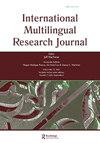CLIL and SIOP: an effective partnership?
IF 2.1
1区 文学
Q2 EDUCATION & EDUCATIONAL RESEARCH
引用次数: 0
Abstract
ABSTRACT This case study examines the use of the Sheltered Instruction Observation Protocol (SIOP®) Model as a framework in the design of an in-service training to answer CLIL teachers’ methodological needs to integrate content and language. The study also analyzes teachers’ receptiveness of the use of SIOP in a CLIL bilingual program to facilitate the integration of content and language. It follows case study methodology and draws on thematic analysis to examine data collected from teacher interviews, questionnaires and observations of the training workshop. Findings showed that one of teachers’ main difficulties was their lack of academic language awareness, and it is concluded that extensive professional development training drawing on some of the principles behind SIOP could assist CLIL teachers to integrate language in content classes. Teachers’ receptiveness of using the SIOP concludes its suitability as a PD training to help non-language specialist teachers systematically plan for language in their content classes. However, adaptations of the Model are suggested to adjust to CLIL contexts and teachers’ needs.CLIL和SIOP:有效的伙伴关系?
摘要本案例研究探讨了在设计在职培训时使用遮蔽教学观察协议(SIOP®)模型作为框架,以满足CLIL教师整合内容和语言的方法需求。本研究还分析了教师在CLIL双语课程中使用SIOP的接受程度,以促进内容和语言的整合。它采用案例研究方法,并利用专题分析来审查从教师访谈、问卷调查和培训讲习班观察中收集的数据。研究结果表明,教师的主要困难之一是缺乏学术语言意识,并得出结论,借鉴SIOP背后的一些原则进行广泛的专业发展培训可以帮助CLIL教师将语言融入内容课程。教师对使用SIOP的接受程度表明,它适合作为一种PD培训,帮助非语言专业教师在其内容课程中系统地规划语言。然而,建议对该模式进行调整,以适应CLIL的背景和教师的需求。
本文章由计算机程序翻译,如有差异,请以英文原文为准。
求助全文
约1分钟内获得全文
求助全文
来源期刊
CiteScore
4.10
自引率
4.80%
发文量
19
期刊介绍:
The International Multilingual Research Journal (IMRJ) invites scholarly contributions with strong interdisciplinary perspectives to understand and promote bi/multilingualism, bi/multi-literacy, and linguistic democracy. The journal’s focus is on these topics as related to languages other than English as well as dialectal variations of English. It has three thematic emphases: the intersection of language and culture, the dialectics of the local and global, and comparative models within and across contexts. IMRJ is committed to promoting equity, access, and social justice in education, and to offering accessible research and policy analyses to better inform scholars, educators, students, and policy makers. IMRJ is particularly interested in scholarship grounded in interdisciplinary frameworks that offer insights from linguistics, applied linguistics, education, globalization and immigration studies, cultural psychology, linguistic and psychological anthropology, sociolinguistics, literacy studies, post-colonial studies, critical race theory, and critical theory and pedagogy. It seeks theoretical and empirical scholarship with implications for research, policy, and practice. Submissions of research articles based on quantitative, qualitative, and mixed methods are encouraged. The journal includes book reviews and two occasional sections: Perspectives and Research Notes. Perspectives allows for informed debate and exchanges on current issues and hot topics related to bi/multilingualism, bi/multi-literacy, and linguistic democracy from research, practice, and policy perspectives. Research Notes are shorter submissions that provide updates on major research projects and trends in the field.

 求助内容:
求助内容: 应助结果提醒方式:
应助结果提醒方式:


